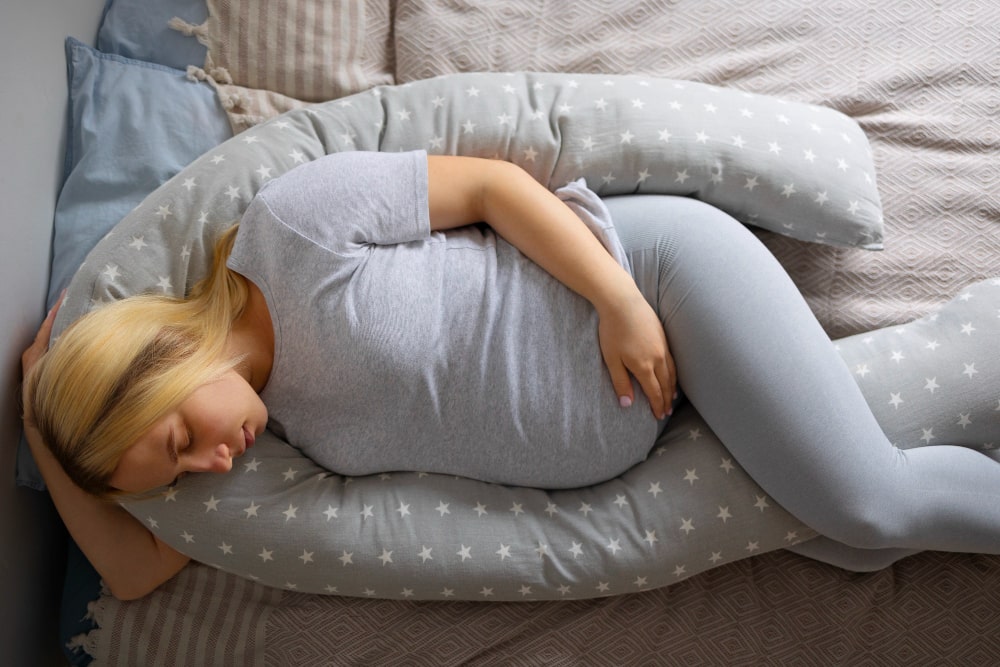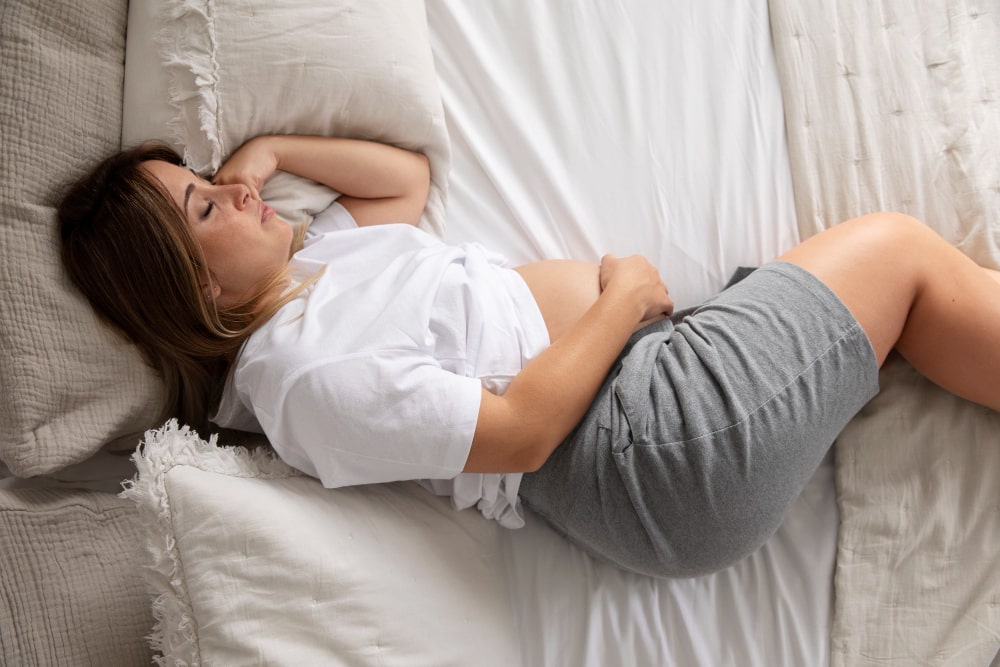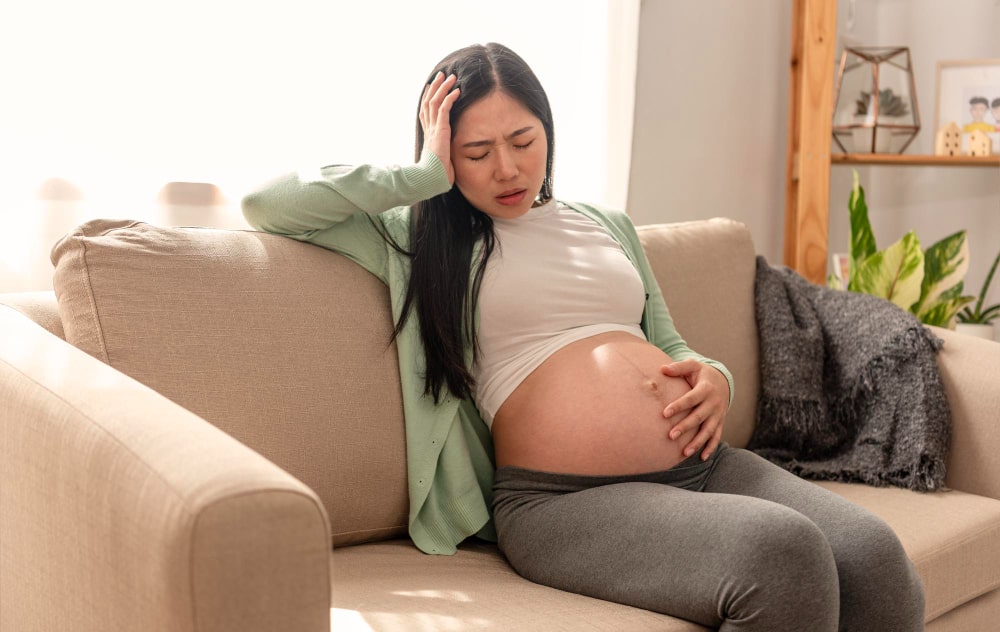During pregnancy, self-care is incredibly important for a mother’s mental and physical well-being. As the baby grows, it causes changes in the body, which can be uncomfortable and painful. One of these pains that many women experience during pregnancy is belly button pain. It may range from mild discomfort to severe pain that needs medical intervention. This article will discuss the causes of belly button pain during pregnancy, symptoms to look out for when to consult a doctor, and ways to manage discomfort.
Understanding Belly Button Pain
Most commonly known as “umbilical pain” or “umbilical hernia,” belly button pain is common in pregnant women. It usually occurs at the location of the umbilicus (belly button) and can radiate to different parts of the abdomen. The pain is usually described as aching, sharp, stabbing, or burning sensation that ranges from mild to severe.
Read More: Pain After Ejaculation: Causes, Symptoms, and Treatment
Causes of Belly Button Pain during Pregnancy

There are several factors that can contribute to belly button pain during pregnancy:
1) Stretching of Ligaments
The ligaments in the abdominal wall stretch to make room for the growing uterus. This stretching causes pain that can be felt at the umbilicus or belly button area.
2) Pressure from Growing Uterus
As your baby grows, it places pressure on internal organs like the bladder and intestines. This can cause abdominal pain and sharp discomfort in the belly button area.
3) Changes in Abdominal Muscles
The muscles that hold your abdomen in place may also experience changes during pregnancy, which can cause pain around the umbilicus (belly button).
4) Umbilical Hernia
An umbilical hernia occurs when a part of the intestine pushes through the muscles around the umbilicus (belly button). It can cause mild to severe pain and discomfort.
5) Skin Irritation
The skin around your belly button may become sensitive and irritated due to hormone changes or increased sweat. This can cause pain and itching.
Read More: Sigmoid Colon Pain: What Causes It, How to Relief Pain?
Symptoms of belly button pain during pregnancy
The most common symptoms of belly button pain during pregnancy are:
- Aching, burning, or stabbing sensation around the umbilicus (belly button).
- Sharp pain in the abdomen that radiates to other parts.
- Pain is exacerbated by movements such as coughing, sneezing, or stretching.
- Swelling around the umbilicus (belly button).
- Itching and redness of the skin in the area.

When to Consult a Doctor
It is important to consult your doctor if you experience any of the following symptoms:
- Severe, persistent pain that does not go away with rest and self-care techniques.
- Pain that is accompanied by fever, chills, or vomiting.
- Swelling around the umbilicus (belly button) that does not go away.
- Redness of the skin in the umbilicus area.
Read More: Stomach Bug While Pregnant: Causes, Symptoms, Remedies
Managing Belly Button Pain
In most cases, belly button pain can be managed effectively with the right self-care techniques. Here are a few tips to help manage your discomfort:
1. Comfortable Clothing
Choose clothing that is not too tight or restrictive around the waist, as this will put pressure on the umbilicus area and worsen your pain.
2. Applying Warm Compress
Applying a warm compress to the area can help reduce pain and discomfort. Make sure to use a soft cloth, such as cotton wool, and never apply heat directly on your skin.
3. Gentle Belly Button Massage
Gently massaging the area with oil or cream can help reduce pain. Make sure to use a light technique and avoid applying too much pressure.
4. Maintaining Proper Posture
Maintaining proper posture can help reduce the strain on your abdominal muscles, which will, in turn, reduce pain in the belly button area. Try to sit up straight and keep your feet flat when standing or walking.
Read More: Pain in Knuckles: What Causes It, How to Relief Pain?
Preventing Belly Button Pain
There are certain steps you can take to reduce your risk of experiencing belly button pain during pregnancy:
Stay Hydrated
Drinking plenty of water helps to keep the body hydrated and prevents abdominal discomfort. Make sure to drink at least eight glasses of water a day.
Regular Exercise
Regular exercise helps to reduce abdominal pain and manage body weight during pregnancy. Try to do light exercises, like walking or swimming, for at least 30 minutes daily.
Balanced Diet and Weight Gain
Eating a balanced diet and gaining the recommended weight can help reduce pressure on the abdominal wall and minimize pain. Speak to your doctor about your diet plan and weight gain goals.
Using Supportive Pillows
When sleeping, use supportive pillows to support your stomach and back. This will help reduce the strain on your abdominal muscles, resulting in less pain.
Read More: Ear Cartilage Pain: What Causes It, How to Treat It?
Myths and Facts about Belly Button Pain
There is a lot of misinformation about belly button pain during pregnancy. Here are some common myths and facts to help you separate the truth from fiction:
Myth: It’s normal to experience severe pain in the umbilicus area, even if it’s your first pregnancy.
Fact: Severe pain cannot be considered ‘normal’ and should be discussed with your doctor.
Myth: Belly button pain is caused by the baby kicking in the area.
Fact: The main cause of belly button pain during pregnancy is stretching the abdominal muscles, not the baby’s movements.
Myth: You can’t do anything to manage discomfort from belly button pain.
Fact: There are several self-care techniques that can help to reduce pain and discomfort, such as drinking plenty of water and using supportive pillows when sleeping.
Read More: Navicular Bone Pain: What Causes It, How to Relief Pain?
Home Remedies for Pain Relief
There are several home remedies you can try to help alleviate the pain and discomfort. Here are a few:
- Warm Baths: Soaking in a warm bath with some Epsom salt or essential oils can help reduce the pain. Make sure the water is lukewarm, not hot, as this can cause dehydration.
- Heat Compress: Applying a heat compress on the belly button can relieve pain. Make sure to use a soft cloth, such as cotton wool, and never apply heat directly on your skin.
- Cold Pack: Applying a cold pack or ice wrapped in a cloth can help reduce inflammation and relieve pain. Make sure to use it for at most 15 minutes at a time.
- Avoid Trigger Foods: Certain foods, such as spicy or acidic, can trigger belly button pain. Avoid these types of foods and drink plenty of water to stay hydrated.
- Essential Oils: Essential oils such as lavender, chamomile, or peppermint have anti-inflammatory and analgesic properties. Add a few drops of the oil to your bath or massage it gently onto the affected area for relief from pain and discomfort.
- Ginger Tea: Ginger is known to have anti-inflammatory properties, which help reduce pain and discomfort. Drinking a cup of ginger tea every day can help alleviate abdominal pain.
The Importance of Self-Care
Self-care is essential during pregnancy for both physical and mental well-being. Taking the time to rest and relax can help reduce stress and manage pain more effectively. Eating healthy food, doing light exercises, drinking plenty of water, and getting enough sleep are all important steps in taking care of yourself.
Read More: Yeast Infection While on Period: What Causes It, How to Treat It?
Conclusion
In conclusion, belly button pain during pregnancy is a common complaint ranging from mild to severe. While it cannot always be avoided, several self-care techniques can help reduce discomfort. It is important to listen to your body and consult with your doctor if the pain becomes persistent or severe. Self-care should also be practiced regularly throughout pregnancy for physical and mental well-being. With the right self-care techniques, belly button pain can be managed effectively so you can enjoy your pregnancy journey.
FAQs
No, belly button pain during pregnancy will not affect your baby. The discomfort is caused by the stretching of abdominal muscles and does not result from the baby’s movements.
No, it is not recommended to use over-the-counter pain relievers for belly button pain. Speak to your doctor about the best treatment options available.
Yes, belly button pain is a common complaint among pregnant women. It is usually caused by hormone changes and increased abdominal pressure due to the baby’s growth.
Belly button pain is usually characterized by aching, burning, or stabbing sensations around the umbilicus. A hernia, on the other hand, is characterized by a bulge in the area and can be painful with certain movements. It is important to consult your doctor if you experience any of these symptoms.

